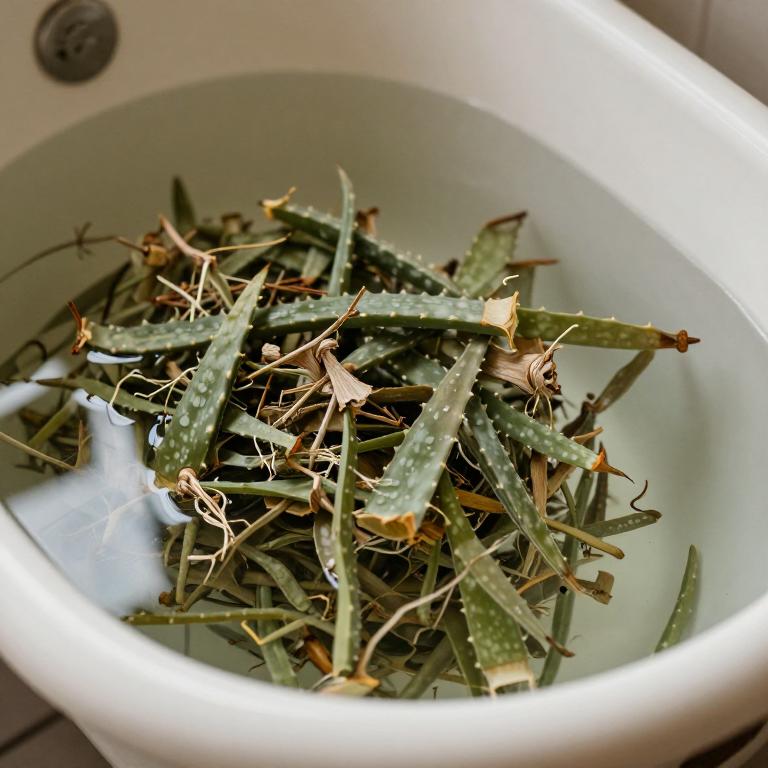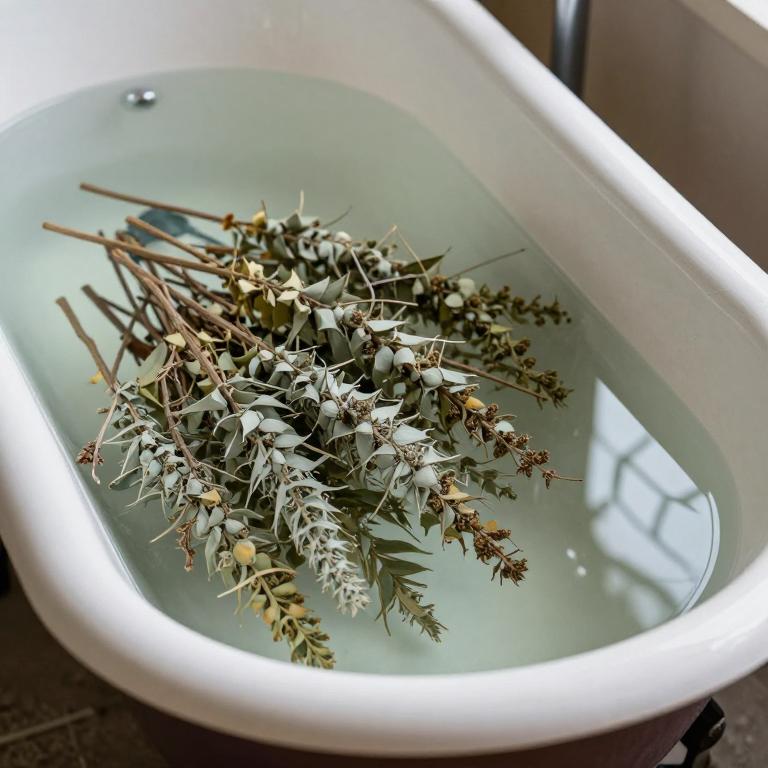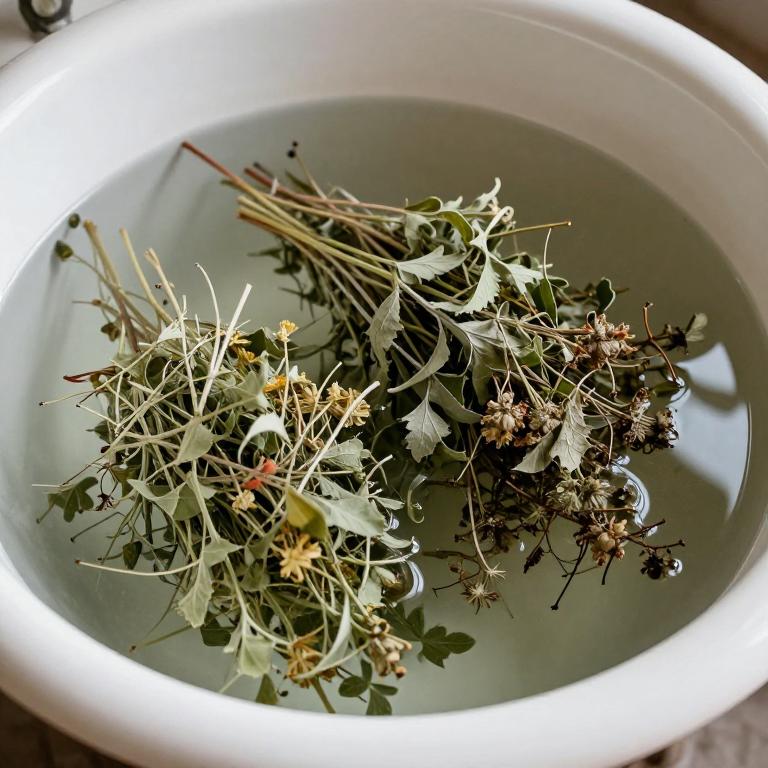10 Best Herbal Baths For Dry Skin

Herbal baths can be a soothing and effective way to nourish and hydrate dry skin.
Infusing warm water with herbs such as lavender, chamomile, or oatstraw can help to soften and moisturize the skin while promoting relaxation. These herbs are known for their anti-inflammatory and soothing properties, which can alleviate dryness and irritation. Taking a herbal bath regularly can improve skin texture and enhance its natural barrier function.
However, it's important to ensure the water temperature is not too hot and to moisturize the skin immediately after bathing to lock in hydration.
Table of Contents
- 1. Aloe vera (Aloe barbadensis)
- 2. Stinging nettle (Urtica dioica)
- 3. Field horsetail (Equisetum arvense)
- 4. Cancer bush (Sutherlandia frutescens)
- 5. Salvia (Salvia officinalis)
- 6. St. john's wort (Hypericum perforatum)
- 7. German chamomile (Chamomilla recutita)
- 8. English lavender (Lavandula angustifolia)
- 9. Rosemary (Rosmarinus officinalis)
- 10. Common mallow (Symphytum officinale)
1. Aloe vera (Aloe barbadensis)

Aloe barbadensis, commonly known as aloe vera, is a natural remedy widely used in herbal baths to soothe and nourish dry skin.
When added to bath water, aloe vera gel or extracts can help hydrate and soften the skin by providing essential moisture and nutrients. Its anti-inflammatory properties may reduce redness and irritation, making it particularly beneficial for individuals with eczema or psoriasis. The soothing scent of aloe can also create a calming and relaxing bath experience.
Regular use of aloe barbadensis in baths can improve skin texture and promote a healthy, glowing complexion.
2. Stinging nettle (Urtica dioica)

Urtica dioica, commonly known as stinging nettle, has been traditionally used in herbal baths to soothe and nourish dry skin.
When prepared as a bath, the leaves and stems of stinging nettle release compounds that can help reduce inflammation and irritation, making it particularly beneficial for those with sensitive or dry skin conditions. The plant contains antioxidants, minerals, and anti-inflammatory properties that may help hydrate and restore the skin's natural barrier. To use stinging nettle in a bath, the fresh or dried leaves can be steeped in hot water and then added to warm bathwater, allowing the skin to absorb the beneficial nutrients.
While generally safe, some individuals may experience a mild stinging sensation upon contact, so it is advisable to test a small area first and avoid using it if you have known allergies to the plant.
3. Field horsetail (Equisetum arvense)

Equisetum arvense, commonly known as field horsetail, is a traditional herbal remedy that has been used for centuries to soothe and nourish dry skin.
Its high concentration of silica and other minerals makes it particularly effective in promoting skin hydration and elasticity. Herbal baths infused with equisetum arvense can help exfoliate dead skin cells and improve skin texture, leaving the skin feeling smoother and more supple. To use it, simply steep the dried plant in hot water and add the infusion to a bath, allowing the skin to absorb its beneficial properties.
However, it is important to use it in moderation and consult a healthcare professional if you have sensitive skin or underlying health conditions.
4. Cancer bush (Sutherlandia frutescens)

Sutherlandia frutescens, also known as cancer bush, is an herbal remedy traditionally used for its potential skin-soothing properties.
When incorporated into herbal baths, it is believed to help alleviate dry skin by promoting moisture retention and reducing irritation. The plant contains various bioactive compounds, including flavonoids and saponins, which may support skin health and hydration. To use Sutherlandia frutescens in a bath, it is typically steeped in hot water and then added to a warm bath for soaking.
While some users report improved skin texture and comfort, it is advisable to consult a healthcare professional before using it, especially for those with sensitive skin or underlying health conditions.
5. Salvia (Salvia officinalis)

Salvia officinalis, commonly known as sage, has been traditionally used in herbal baths to soothe and nourish dry skin.
The plant contains essential oils and antioxidants that help to moisturize and restore the skin's natural barrier. When infused into bath water, sage can provide a calming and aromatic experience that promotes relaxation while improving skin texture. Its anti-inflammatory properties may also help reduce redness and irritation associated with dryness.
Incorporating sage into a weekly herbal bath routine can be a gentle yet effective way to hydrate and revitalize dry skin.
6. St. john's wort (Hypericum perforatum)

Hypericum perforatum, commonly known as St. John's Wort, has been traditionally used in herbal baths to soothe and nourish dry skin.
When infused into warm bath water, the oil from the dried plant helps to moisturize and soften the skin, reducing dryness and irritation. The anti-inflammatory and antioxidant properties of St. John's Wort may help to calm redness and promote skin healing. To prepare a herbal bath, steep a handful of dried hypericum perforatum in boiling water for several hours, then strain and add to a warm bath.
This natural remedy is particularly beneficial for those with eczema, psoriasis, or other dry skin conditions, offering a gentle and calming alternative to commercial skincare products.
7. German chamomile (Chamomilla recutita)

Chamomilla recutita, commonly known as German chamomile, is a popular herbal remedy used in baths to soothe and nourish dry skin.
Its calming and anti-inflammatory properties help reduce redness, irritation, and itchiness associated with dryness. When infused into bath water, chamomile releases essential oils that penetrate the skin, providing a gentle yet effective moisturizing effect. The warm water enhances the absorption of these beneficial compounds, leaving the skin feeling soft and refreshed.
Regular use of chamomile herbal baths can help maintain skin hydration and promote a sense of relaxation and well-being.
8. English lavender (Lavandula angustifolia)

Lavandula angustifolia, commonly known as English lavender, is a popular herb used in herbal baths for its soothing and therapeutic properties.
When added to bath water, lavender essential oil or dried lavender flowers can help moisturize and calm dry, irritated skin. The anti-inflammatory and antimicrobial properties of lavender promote skin healing and reduce redness. Its calming aroma also has a relaxing effect, making it beneficial for both skin health and mental well-being.
Regular use of lavender-infused baths can improve hydration and enhance the overall appearance of dry skin.
9. Rosemary (Rosmarinus officinalis)

Rosmarinus officinalis, commonly known as rosemary, is a fragrant herb that has been traditionally used for its therapeutic properties, including its ability to soothe and nourish dry skin.
When incorporated into herbal baths, rosemary leaves release essential oils that can help improve circulation and reduce skin inflammation. The anti-inflammatory and antioxidant properties of rosemary can help hydrate and restore the skin’s natural barrier, making it particularly beneficial for those with dry or sensitive skin. To use rosemary in a bath, simply steep fresh or dried rosemary in hot water and then add it to a warm bath, allowing the steam to release its aromatic compounds.
This calming and invigorating bath experience not only moisturizes the skin but also promotes relaxation and overall well-being.
10. Common mallow (Symphytum officinale)

Symphytum officinale, commonly known as comfrey, has been traditionally used in herbal baths to nourish and soothe dry skin.
The plant contains allantoin, a compound known for its skin-soothing properties that can help promote healing and hydration. When used in a bath, comfrey can help soften rough, dry patches and improve skin texture by increasing moisture retention. However, it is important to note that comfrey should not be used on open wounds or for extended periods due to potential skin irritation.
For those with sensitive skin, a patch test is recommended before incorporating comfrey into a regular bathing routine.